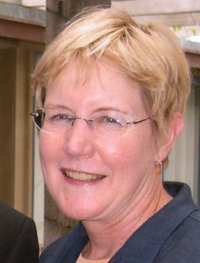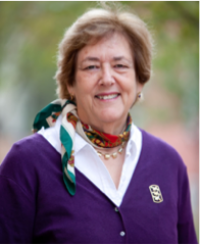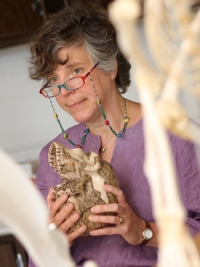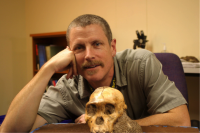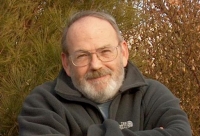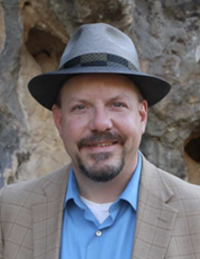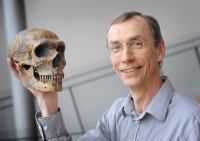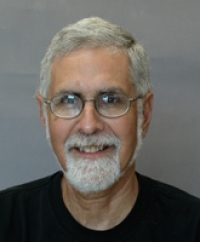The Origin and Fate of the Neanderthals
Biographical Sketches: Co-Chairs
UC San Diego
Margaret Schoeninger is Distinguished Professor Emerita of Anthropology at UC San Diego, a Research Archaeologist in the Glenn Black Laboratory of Archaeology at Indiana University, and Emerita Co-Director of CARTA. She has done fieldwork in North America, Mexico, Pakistan, India, Kenya, and Tanzania as well as laboratory research on carbon, nitrogen, and oxygen stable isotope ratio analysis in biological tissues and food component analysis of traditional foods. Her major interest is in the evolution of human diet particularly as it informs our understanding of the appearance and evolution of the human lineage.
Biographical Sketches: Speakers
George Washington University
Alison S. Brooks is a professor of anthropology and international affairs at the George Washington University and a founding member of the Center for the Advanced Study of Hominid Paleobiology (CASHP). In addition, she is a research associate in the Human Origins Program at the National Museum of Natural History, Smithsonian Institution, a visiting researcher at Harvard University and a fellow of the American Academy of Arts and Sciences. She received her PhD from Harvard in 1979 for research on the initial Upper Paleolithic occupation of Western Europe. As the origins of these first “anatomically modern” Europeans clearly lay outside that continent, her fieldwork has explored the Pleistocene prehistory of multiple African countries. These include Botswana, where she studied the lifeways of San hunter-gatherers and documented their long-term history, Zimbabwe, D.R. Congo, Ethiopia, Kenya, Tanzania and South Africa. Her African work focuses on defining and dating the Middle Stone Age of Africa and understanding both cultural diversification within Africa and the cognitive and behavioral transformations that led to the expansion of our species throughout the world. She was instrumental in developing chronometric techniques for sites that are too old for radiocarbon, and in documenting the oldest evidence for fishing technologies and projectile weapons, as well as early evidence for the expansion of social networks and symbolic behavior, and the first evidence that starch grains were preserved in the dental calculus of fossils from Africa, the Near East and Europe, allowing us to reconstruct the plant segment of their diets. She is co-editor of The Encyclopedia of Human Evolution and Prehistory and her scholarly papers include “The Revolution That Wasn’t: A New Interpretation of the Origin of Modern Human Behavior” with Sally McBrearty in the Journal of Human Evolution (2000).
Central Michigan University
Rachel Caspari is a Professor of Anthropology at Central Michigan University and a member of the Core Center for Musculoskeletal Disorders in the Bone Research Center at the University of Michigan. Dr. Caspari is a paleoanthropologist with a focus on the Upper Pleistocene and demographic changes in human evolution. She has worked on fossil human remains from Europe, Africa and Asia, and is particularly interested in the role of changes in population structure and life history in the Middle/Upper Paleolithic transition and the origin of modern humans. Dr. Caspari’s current research focuses on methods to increase the resolution and accuracy of age at death estimates in prehistoric remains, using high resolution computed tomography to assess age-related histological changes in dental tissues to better address the evolution of human age structure and senescence. Dr. Caspari also has a long-standing interest in the relationship between race and epistemology in paleoanthropology, and is the co-author of the award winning Race and Human Evolution (Simon and Shuster, 1997).
Duke University
Steven Churchill is a Professor and past Chair of the Department of Evolutionary Anthropology at Duke University. He is also an Honorary Reader in the Evolutionary Studies Institute and Centre for Excellence in PalaeoSciences at the University of the Witwatersrand. Dr. Churchill received a B.S. from Virginia Tech and an M.A. and Ph.D. from the University of New Mexico before joining the faculty at Duke in 1995. He is a paleontologist who studies the fossil record of human evolution, especially that of early members of our genus (Homo) that lived between about two million to ten thousand years ago.
University of Utah
Henry Cosad Harpending (January 13, 1944 – April 3, 2016) was an American anthropologist, population geneticist and Distinguished Professor at the University of Utah. Harpending received his A.B. degree from Hamilton College and his Ph.D. from Harvard University in 1972. He was a member of the National Academy of Sciences. Harpending studied genetic and morphometric variation within and between human populations with mathematical models, examining hypotheses such as population growth, divergence, and gene flow. Harpending did extensive fieldwork in Southern Africa (Botswana, Namibia) and spoke the !Kung language fluently. In The 10,000 Year Explosion, which he co-authored with Gregory Cochran, Harpending suggests a common belief that human genetic adaptation stopped 40,000 years ago is incorrect and that humans evolved increasingly rapidly in response to the new challenges presented by agriculture and civilization. The result was accelerating evolution which has varied according to new niches or environments that particular populations inhabit.
University of Wisconsin—Madison
Professor John Hawks is an internationally recognized expert on human evolution and genetics. His most recent fieldwork in South Africa focuses on the Rising Star cave system, where he is a core member of the team that discovered the previously unknown species Homo naledi. He is also known for his work demonstrating the rapid evolution of modern humans within the past 40,000 years; and for exploring the contribution of ancient Neandertals to the ancestry of people living today. He has done fieldwork in Africa, Asia and Europe, combining skeletal evidence from fossils with new information from genetics to uncover how humans evolved. His work on human genetics connects to global health, including research exploring the structure of genetic networks underlying celiac disease and type 2 diabetes.
Hawks’ work has been featured in documentaries from PBS Nova, PBS Secrets of the Dead, National Geographic, Science Channel, and the BBC. Print coverage of his work has included cover and feature articles in Discover, Scientific American, Archaeology, Science News, New Scientist, coverage in the New York Times, USA Today, Time, Der Spiegel and many others.
Professor Hawks has been a leader in public outreach and the movement toward open science. His blog (http://johnhawks.net) was recognized by Nature as one of the top 15 science blogs, and received more than 700,000 visits from readers in 2019, more than 40% outside the U.S. He taught a massive open online course (MOOC) titled “Human Evolution: Past and Future” for the University of Wisconsin-Madison in 2014, with a registration of more than 40,000 students worldwide.
Hawks has been at the University of Wisconsin-Madison since 2002 and is presently the Vilas-Borghesi Distinguished Achievement Professor of Anthropology. He serves as Associate Chair of Anthropology and an associate member of both the Department of Zoology and the J. F. Crow Institute for the Study of Evolution. He is an honorary professor and associate of the Evolution Studies Institute at the University of the Witwatersrand, Johannesburg, South Africa.
Max Planck Institute for Evolutionary Anthropology
Svante Pääbo is the Director of the Department of Genetics at the Max Planck Institute for Evolutionary Anthropology. Pääbo has developed techniques that allow DNA sequences from archaeological and paleontological remains to be determined. This has allowed the reconstruction of the Neandertal genome and the discovery of Denisovans, a previously unknown group in Asia related to Neandertals. He also works on the evolution of genetic features that may underlie aspects of traits specific to humans. Pääbo is the 2022 recipient of the Nobel Prize in Physiology or Medicine “for his discoveries concerning the genomes of extinct hominins and human evolution.”
University of Michigan
John D. Speth holds an Arthur F. Thurnau (Emeritus) Professorship for Outstanding Contributions to Undergraduate Education; he is also Emeritus Professor of Anthropology in the Department of Anthropology and Emeritus Curator of Archaeology in the Museum of Anthropological Archaeology at the University of Michigan (Ann Arbor). He served as director of the Museum of Anthropology from 1986 to 1989 and as the Museum’s associate director from 2006 to 2008. Dr. Speth completed his B.A. in geology at the University of New Mexico (1965), and his M.A. (1968) and Ph.D. (1971) in anthropology at the University of Michigan. Dr. Speth studies hunter-gatherers, past and present, New World and Old World. He is interested in the evolution of forager diet, subsistence practices, and food processing technologies and, more specifically, in the ways that hunter-gatherers cope with seasonal and inter-annual unpredictability in their resources. He also is exploring Neanderthal hunting strategies in the Near East. Dr. Speth served for more than 25 years as secretary-treasurer for the Irene Levi-Sala CARE Archaeological Foundation for Prehistoric Research in Israel. In the past, he has been a member of the executive board of the Society for Ethnobiology, member of the National Science Foundation Archaeology Panel, member of the editorial board of Annual Review of Anthropology and Before Farming, member of the U.S. National Committee for the International Union of Quaternary Research (USNC/INQUA), and member of the executive committee of the Society for American Archaeology (SAA). His most recent books, both published by Springer, are The Paleoanthropology and Archaeology of Big-Game Hunting: Protein, Fat, or Politics? (2010) and Zooarchaeology and Modern Human Origins: Human Hunting Behavior During the Later Pleistocene (2013, co-edited with Jamie L. Clark). His recent papers on the evolution of human foodways include “When Did Humans Learn to Boil?” (2015) and "Putrid Meat and Fish in the Eurasian Middle and Upper Paleolithic: Are We Missing a Key Part of Neanderthal and Modern Human Diet?" (2017), both in PaleoAnthropology, and "Neanderthals, Vitamin C, and Scurvy" (2019), in Quaternary International.
